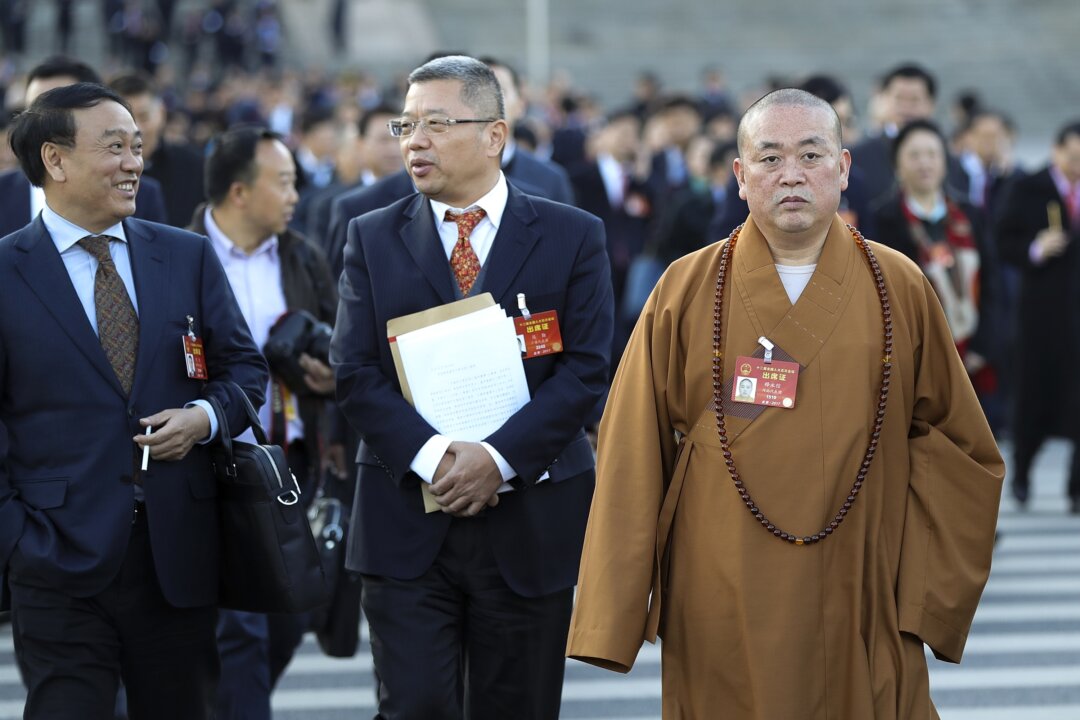The head of China’s Shaolin Temple, the fabled birthplace of kung fu and Zen Buddhism, has been placed under investigation for alleged criminal offenses, according to the monastery.
Shi Yongxin, who held the abbot’s position for more than 25 years, was suspected of “embezzling and misappropriating project funds and temple assets,” the temple’s authority said in a July 27 statement on its official WeChat account.
The 60-year-old monk also faces accusations of breaching the Buddhist precepts by “maintaining improper relationships with multiple women over a long period” and fathering at least one illegitimate child, according to the notice.
In a statement dated July 28, China’s Buddhist Association, a state-controlled body that oversees Buddhist activities, announced that it has approved a decision to revoke Shi’s ordination certificate, an official proof of his monastic status.
“Shi Yongxin’s actions are extremely bad, severely damaging the reputation of Buddhism and the image of monks,” the country’s top Buddhist authority said.
Shi had served as deputy president of the association since 1998.
The Shaolin Temple, situated in the central Chinese city of Zhengzhou, is one of the most renowned Buddhist monasteries in the country and the world. Originally a place for spiritual practice, the ancient temple has undergone significant changes under the rule of the Chinese Communist Party (CCP).
Today, Shaolin Temple has become a global business, boasting multiple ventures that include a film and television company, a painting academy, a publishing house, and a performing arts troupe, all built by Shi, who has gained a reputation as the “CEO Monk.”
In addition to business activities, Shi held several administrative posts in China. In 1998, Shi was appointed to the National People’s Congress, a Party-controlled rubber-stamp legislature, by then-Chinese leader Jiang Zemin—a role he held for 20 years.
According to an exposé published in the Chinese business publication Caixin in 2015, Shi had a close relationship with the late CCP leader Jiang, Henan Party chief Li Changchun, and Buddhist Association head Zhao Puchu. It was under Zhao’s instructions that Shi turned Shaolin Temple into a business empire, the report said.
In August 2018, the Buddhist sanctuary held its first-ever flag-raising ceremony, following the CCP’s order for religious venues to fly its red national flag. The event marked the first time in the temple’s some 1,500-year history that it formally declared a political stance.
During Shi’s tenure, the Shaolin Temple established cultural centers in the United States, Australia, and several other European countries. According to a July 2024 report by state-run outlet Global Times, the total number of overseas Shaolin cultural centers has surpassed 200.

Originally named Liu Yingcheng, Shi entered the Shaolin Temple in 1981, becoming its abbot at the end of the 1990s, according to the temple’s official website.
Shi had been caught up in multiple scandals involving embezzlement and illicit sexual activity over the past decade. In 2015, for example, he allegedly had relationships with several women, including nuns and believers, and fathered two illegitimate children.
On July 27, news of Shi being probed quickly became a top trending topic on Weibo, China’s version of X, racking up half a trillion views within a few hours.
Just hours before the temple authority’s announcement, a post titled police notice widely circulated on Weibo, claiming that local authorities had intercepted Shi while he attempted to flee to the United States with his mistresses and children. Local police officials at the time dismissed it as fake news.
Shi’s last post on his official Weibo account, which was updated daily and has more than 880,000 followers, was on July 23, in which he shared his interpretation of Buddhist teachings.
Nichole Hao and Annie Wu contributed to this report.

